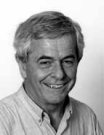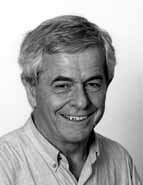AUSTRALIAN POETS AT WORK SERIES 2
Chris Wallace-Crabbe
Selected by Coral Hull

[Above] Photo of Chris Wallace-Crabbe by photographer unknown, year unknown.
CH: Talk about a piece of visual art that has touched you?
CWC: Along with the excitements of Klee, van Gogh and Turner, there was always Piero della Francesca, the most solid of Renaissance painters. While I love his Baptism of Christ, in London, I would have to say that my very favourite work is his Resurrection, which is such a direct account of strength without pomp. Of all Renaissance painters he was the one who most anticipated the chunky glories of Modernism; and he kept the feet of his angels firmly on the ground. Later, I came to understand Matisse, and the language of colour.
CH: What are you working on at the moment?
CWC: I'm working on a long sequence of free-ish quinzaines, of serious moral import. I know that doesn't sound exactly like me, but the age demands it, our time of scarcely mitigated violence and stupidly conceived wars. The fault may be laid at the tail of the Serpent, which is to say of Homo Sapiens, and evolution.
CH: Talk about when you first fell in love?
CWC: I first fell in love at the age of eighteen, with a girl whom I'll call J. It was an overwhelming sensation, especially as I was shy and we both were virtuous. However, it fell apart when I was doing my
National Service, at Laverton. After the crunch, I sat one night in my Baby Austin, somewhere in darkened Royal Park, and cried myself silly. Forty-five years later, my partner and I saw her on the surf beach at Point Lonsdale, slim and tanned in a bikini; afterwards, my partner said, "Your first girlfriend meets your last". That must be right. Love saves us from the universal death, as D.H. Lawrence knew so well, if not always wisely.
CH: What is your favourite animal and why?
CWC: My favourite animal is the elephant. They have such lovely personalities, wise and patient: moreover, they're said to have great memories. And I do like the psychology of dogs. They're like characters in a novel, I find. But as a child I was attracted to exotic animals, especially the okapi and the golden agouti. Now I find wombats extremely calming. But I can never forget how "the cruel hunter" shot Babar's mother.
CH: Why is poetry important to you?
CWC: Poetry is important to me because it's the best kind of writing, although some novelists are very good indeed. And such a short-story writer as Katherine Mansfield rises to the condition of poetry. Writing it is what I do, and what I have to do. Poetry can be a kind of intense magic, like the piano music of Chopin and Debussy, distilling the universe into a verbal cognac. A great poem includes its own music, like a song by Berlioz or Schubert.
CH: What are you afraid of?
CWC: I'm afraid of heights, of still water, and of cremation. Having renounced immortality, I am content to decay slowly near the body of my eldest son.
CH: What did you want to be when you grew up?
CWC: I wanted to be an industrial chemist.
CH: What are your primary concerns regarding the world?
CWC: Well, I'm not at all happy about the world. Human beings are its major problem and yet we, the reflective ones, are part of that species. We are destroying the planet, and those who believe in unqualified "free enterprise" should all be imprisoned at Guantanamo Bay. The Greens, for all their political naivete, appear the only political group with any sense at all of our planet's fate, which descends on our grandchildren very rapidly indeed. We live among powerful people whose only policy is destruction: blatant cheats, liars and short-term profiteers. As a philosopher recently said, nobody can look more than fifteen years ahead. Fortunately, I'll already be dead when Earth descends into plagues and uncivil wars, but I do worry a great deal about my granddaughter.
| |
THE STONE'S IN THE MIDST OF ALL
Little by little
things have been passing over me,
liquid, furry, ephemeral
slowcoach aeons and banks of cloud.
There have been good and bad millennia
according to some principle or other.
Sometimes I shift a bit
but mostly just lie around
while happening happens to others
who then go away.
Soon enough:
it's hard to know what they were there for.
So here I am
and abide
taking things pretty much as they come,
different from the fickle weather,
set in my ways but
gaining a certain polish.
And our speculative humans, lairy
with all their bundles of hubbub,
their brief diversity,
drift clean away.
Remember those worthy Neanderthals?
Gone with the long wind.
A FAUN'S ARVO
Memory is a curious organ
and can also be inflated, as you know
or half-know,
however language tries to tie it down.
When there was no There
Lilith or Sheba came,
preceding even the name of the game,
so the brain obliquely remembers,
and the limbs do.
Her ghost stirs smokily underneath
our human muscle and breath.
Somewhere at full midnight then
the grass has been utterly trodden down;
there are horse-tracks in the sand.
These nymphs, I'd like to put them in a film,
the other poet said about all this,
bees murmuring in a ripeness
through his eclogue,
making nothing happen once again.
Listen! The shape of hooves
lost in your blood.
GRASSES
Sternly avoiding the asphalt, treading on grass
I pick my pernickety way across
this common urban transliteration of landscape,
the oddly broadcast parks and median-strips,
saluting the god of grass with the rub of my feet:
feet which are held at bay by animal-skins,
tanned, sewn, polished, and frequently scuffed.
Whitman wrote about your multiplicity
as leaves, and yet those thousands of blades are you,
billions, rather. Bland in your closepacked greenness,
your number exceeds those from whose fate you sprout.
Lushly after rain or wispily blond in summer,
bowing briefly you offer a carpet's welcome
still to the odd walker.
Lightly arriving
at a roundabout, I would choose the diagonal,
taking note of kikuyu, buffalo, bent and sedge,
feeling in touch, treading a kind of worship
or else, playing with language, my worship of kind.
Old Whitman thought you the hair of young dead men
but you whisper at my feet
that something will survive.
A CREEKMOUTH
From peasoup hue to coastal silvering
The broad creek slides and shivers,
Having for a clammy sleeve,
awhile,
dark swamp
Under this abstract orchestra of paperbarks, elegantly trunked,
Their crests all a-twitter --
The ground far more lethargic.
As you go woodenly treading,
Grizzled sand bulges up through this muddiness,
Respectable waterhens are paddling
Their little gondolas along,
Sounding the horn,
black duck beat
Water like an Irish washerwoman
While the boobialla has rocket
explosions of leaf.
Brookweed and seablite dither nearby,
Hardly calling for notice
But now the metallic gum-tops are rattling
far overhead,
Banksias do the baroque in style
(They pay continuing tribute to Cook and
that yuppie Sir Joseph)
While a supercilious magpie
gargles beyond it all.
The sand is yellowing:
We near the sea
Which is too vast and swollen to be taking
Any notice at all
Of nation, hemisphere, or history.
Acknowledgments to: Next (Gungurru Press, Brunswick, 2004), The London Magazine (UK), Jacket (Australia). |
About the Poet Chris Wallace-Crabbe

|
Christopher Keith Wallace-Crabbe, poet and essayist, is now an Emeritus Professor in The Australian Centre, University of Melbourne. Born to a journalist and a pianist, he grew up with a family tradition of military-bohemian Scots. On leaving school he worked at such jobs as cadet metallurgist and electrical trade journalist before finding his metier as poet and as a university teacher. He has lived in Britain, the United States and Italy, as well as in his natal Melbourne, has taught at Harvard and read his poems all round the world. Wallace-Crabbe has published a dozen books of poetry, plus prose works, art criticism and varied anthologies. For diversion he walks, draws and plays tennis. |
[Above] Photo of Chris Wallace-Crabbe by photographer unknown, year unknown.
I Next I
Back I
Exit I
Thylazine No.12 (June, 2007) |



